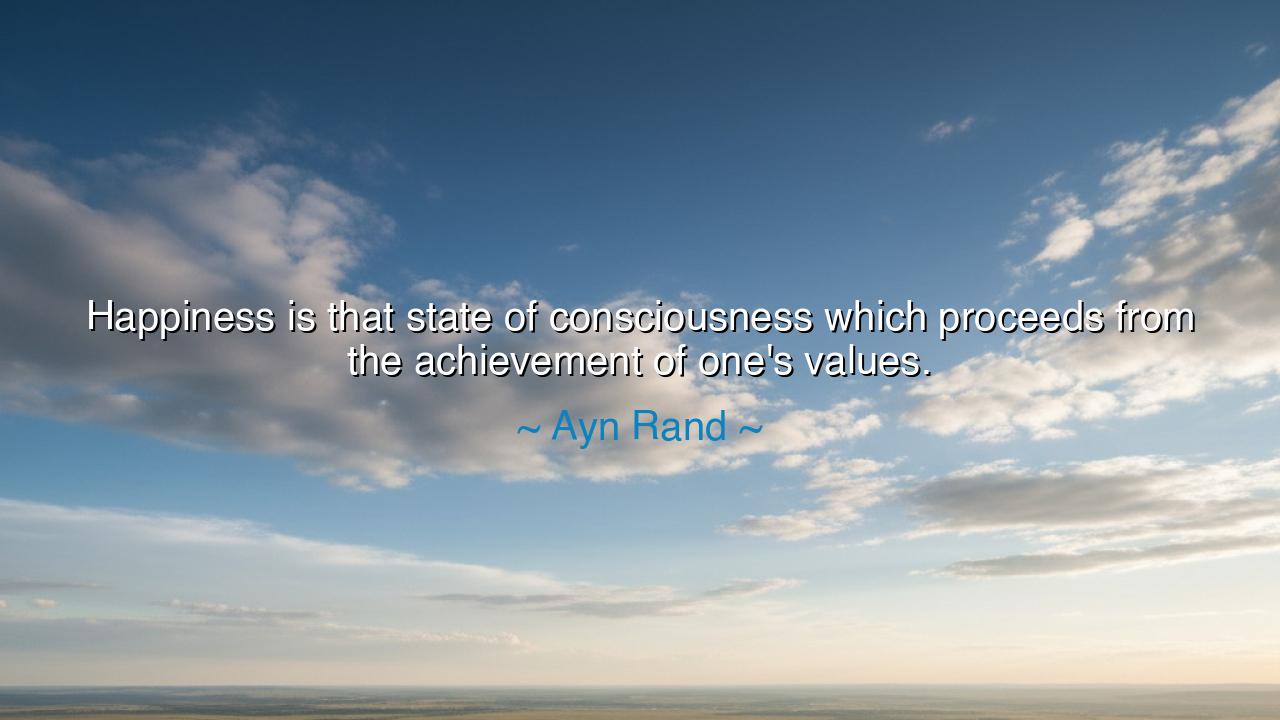
Happiness is that state of consciousness which proceeds from the
Happiness is that state of consciousness which proceeds from the achievement of one's values.






Hear now the words of Ayn Rand, a voice fierce as fire and sharp as steel: “Happiness is that state of consciousness which proceeds from the achievement of one’s values.” This is no gentle whisper about fleeting pleasure—it is a declaration of spiritual law. For happiness, in Rand’s vision, is not a gift granted by fate, nor a momentary joy stumbled upon by chance. It is the proud result of achievement, the natural consequence of living in harmony with one’s values, of shaping the world in the image of one’s highest ideals.
To understand her meaning, we must first understand what values are. They are not the trinkets of convenience, nor the whims of momentary desire, but the principles that give structure and meaning to one’s life. A man’s values are his compass; they point him toward purpose and keep him from drifting in the tides of uncertainty. To live without values is to wander without direction, to breathe without truly living. Thus, when Rand speaks of happiness as the fruit of achieving one’s values, she means that joy arises when action and belief are one—when what we do is in harmony with who we are.
In the ancient world, philosophers sought this same truth, though by different names. Aristotle called it eudaimonia, the flourishing of the soul through virtuous action. He, too, taught that happiness is not mere pleasure, but the outcome of a life lived according to reason and excellence. Yet where Aristotle spoke of virtue, Rand spoke of rational self-direction—the glory of the individual mind choosing its own path, unshackled by guilt or conformity. To her, joy was not the surrender of the self to others, but the triumphant affirmation of the self’s worth.
Consider the story of Thomas Edison, who failed a thousand times before the lightbulb burned. Each failure was a step toward mastery, each setback a test of his devotion to his values—innovation, perseverance, and creation. When the light finally shone, his happiness was not merely the thrill of success, but the deep, glowing satisfaction of a man whose labor had made his vision real. That is the happiness Rand described—not the fleeting pleasure of indulgence, but the lasting pride that arises when one’s work becomes a mirror of one’s soul.
Rand’s message burns especially bright in a world that often confuses comfort for happiness. Many seek joy through ease, applause, or possessions, yet find themselves empty when the lights dim. For true happiness cannot be borrowed or bought; it must be earned. It demands effort, integrity, and courage—the willingness to pursue one’s values even when the path is steep and lonely. The heart that betrays its values for approval or security will never know peace; it will dwell forever in quiet discontent, haunted by the ghost of what might have been.
But the one who remains faithful to his values—who works, loves, and creates according to his own inner truth—walks a different path. His consciousness is alive, awake, and free. He does not chase happiness as a distant prize; he lives it each moment he acts in harmony with his convictions. Even in struggle, he feels its quiet power, for he knows that meaning, not comfort, is the foundation of joy. To such a person, life itself becomes an act of art, and happiness the melody that follows naturally from creation.
Let this be your teaching: Define your values. Know what you stand for, and why. Build your life upon that foundation with unyielding honesty. Do not seek happiness in the opinions of others or in the ease of the untested life. Instead, labor for your ideals, even when the world mocks or resists you. For when your work reflects your soul, and your choices honor your truth, happiness will not elude you—it will flow from you, radiant and unstoppable.
Thus spoke Rand, not as a preacher of comfort, but as a herald of freedom. Her truth is as old as reason itself: that joy is not found in surrender, but in creation; not in compromise, but in achievement. The gods of fortune may smile or frown, but the man who lives by his values carries his own sun within him. And when that sun burns bright, he needs no other light.






AAdministratorAdministrator
Welcome, honored guests. Please leave a comment, we will respond soon